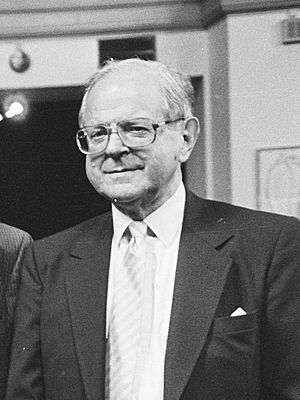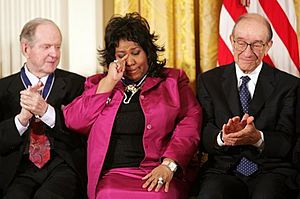Robert Conquest facts for kids
Quick facts for kids
Robert Conquest
|
|
|---|---|

Conquest in 1987
|
|
| Born | George Robert Acworth Conquest 15 July 1917 Great Malvern, Worcestershire, England |
| Died | 3 August 2015 (aged 98) Stanford, California, U.S. |
| Occupation | Historian, poet |
| Nationality | British |
| Citizenship | American |
| Education | Winchester College |
| Alma mater | |
| Notable works | The Great Terror |
| Notable awards | See below |
| Spouse |
|
| Children | 3 |
George Robert Acworth Conquest (15 July 1917 – 3 August 2015) was a famous British-American historian and poet. He was known for his important work on the Soviet Union.
Conquest spent many years as a researcher at Stanford University's Hoover Institution. His most famous books include The Great Terror (1968), which was about Joseph Stalin's purges. He also wrote The Harvest of Sorrow (1986) about a terrible famine. Another key book was Stalin: Breaker of Nations (1991). Besides history, he wrote novels and poetry.
Contents
Early Life and Education
Robert Conquest was born in Great Malvern, Worcestershire, England. His father was American, and his mother was English. His father was a soldier in World War I and received an award for his bravery.
Conquest went to Winchester College, a well-known school. He then earned a scholarship to study at Magdalen College, Oxford. Before Oxford, he spent a year studying in France and Bulgaria. When he returned to Oxford in 1937, he joined the Communist Party of Great Britain for a short time. He earned advanced degrees in Philosophy, Politics, Economics, and History.
Career Highlights
Serving During World War II
When World War II started, Conquest was in Lisbon. He quickly returned to England. He left the Communist Party because they did not support the war. In 1940, he joined the British Army.
In 1943, he studied Bulgarian at the School of Slavonic and East European Studies. The next year, he went to Bulgaria to work with Bulgarian forces. After the war, he joined the Foreign Office, working as a press officer in Sofia. In 1948, he returned to London after helping two Bulgarians leave the country.
Working for the Foreign Office
In 1948, Conquest joined the Information Research Department (IRD). This group was created by the British government to share information about Soviet and communist actions. The IRD aimed to inform journalists and politicians. Conquest was seen as a very smart and confident person there. He worked for the Foreign Office until 1956. During this time, he became deeply involved in fighting against communist ideas.
Conquest wrote several papers at the Foreign Office. These papers laid the groundwork for his later historical books. For example, one paper on how the Soviets got confessions was used in The Great Terror.
Becoming a Writer
In 1956, Conquest left the Foreign Office to become a full-time writer and historian. The IRD suggested he use the information he had gathered for a book. During the 1960s, he edited several books based on IRD research.
He also worked as a literary editor for The Spectator magazine from 1962 to 1963. But he left that job to focus on his historical writing. His first books about the Soviet Union included Common Sense About Russia (1960) and Power and Policy in the USSR (1961).
Important Historical Books
The Great Terror (1968)
In 1968, Conquest published The Great Terror: Stalin's Purge of the Thirties. This book was the first detailed study of the Great Purge in the Soviet Union. This terrible event happened between 1934 and 1939.
The book used information that became public during the "Khrushchev Thaw" (1956–1964). It also used stories from Russian and Ukrainian people who had left the country. Conquest's book showed that the purges were much wider than just the famous "Moscow trials" of Communist leaders.
Conquest believed that Stalin's purges led to the deaths of millions of people. He later said the number was likely between 13 and 15 million. He also criticized many Western thinkers who he felt supported or excused Stalin's actions.
After the Soviet archives were opened, new information became available. Conquest argued that this new information supported his findings. He published a revised version in 1990 called The Great Terror: A Reassessment. Some historians still debate his exact numbers, but his work was very important.
The Harvest of Sorrow (1986)
In 1986, Conquest published The Harvest of Sorrow: Soviet Collectivisation and the Terror-Famine. This book was about the forced collection of farms in Ukraine and other parts of the USSR. This policy, led by Stalin from 1929 to 1931, caused a massive famine. Millions of peasants died from starvation, forced labor, or execution.
Conquest argued that this famine was a planned act of genocide. He believed that Stalin could have stopped the famine but chose not to, putting other "Soviet interests" first.
Stalin and the Kirov Murder (1989)
Conquest also wrote about the murder of Sergei Kirov in 1934. Kirov was a top Communist leader. In his book Stalin and the Kirov Murder (1989), Conquest suggested that Stalin might have been involved in Kirov's assassination. He argued that Stalin used this murder as an excuse to start the widespread terror that followed.
Poetry and Other Writings
His Poems
Besides his historical work, Robert Conquest was also a respected poet. His poems appeared in magazines starting in 1937. He won awards for his poetry, including the PEN Brazil Prize in 1945. He published seven books of poetry during his life.
Conquest was a key member of a British literary group called "The Movement." This group included famous poets like Philip Larkin. These poets preferred clear, simple language over more experimental styles. Conquest edited important collections of their work called New Lines in 1956 and 1962.
He also translated a long poem by the famous Russian writer Aleksandr Solzhenitsyn called "Prussian Nights" in 1977.
His Novels
Conquest enjoyed science fiction. He worked with his friend, the writer Kingsley Amis, to edit five collections of new sci-fi stories called Spectrum. They also wrote a funny novel together called The Egyptologists (1965). Conquest also wrote his own science fiction novel, A World of Difference (1955).
Political Ideas
What to Do When the Russians Come (1984)
In 1984, Robert Conquest co-wrote What to Do When the Russians Come: a Survivor's Guide. This book was a fictional guide about what to do if the Soviet Union invaded the United States. It reflected fears during the 1980s that the Soviet Union might try to take over the world.
Conquest once said that thinking about the Soviet Union like "Martians" helped understand them better. He meant they were so different from Western societies that it was like they were from another planet.
Reflections on a Ravaged Century (1999)
In Reflections on a Ravaged Century, Conquest explored why people become fanatics. He argued that Communism and Nazism were similar in their extreme ideas. He focused on why many Western thinkers supported communism, often believing it was a way to fight fascism.
Conquest's Laws of Politics
Robert Conquest also had some interesting observations about politics, which he called his "laws":
- First Law: Generally, everyone is very traditional or "reactionary" about things they know a lot about.
- Second Law: Any organization that isn't clearly right-wing will eventually become left-wing.
- Third Law: The easiest way to explain how a large organization (a bureaucracy) behaves is to imagine it's secretly controlled by its enemies.
These ideas became well-known among certain thinkers.
Personal Life
Robert Conquest was married four times. He had two sons with his first wife, Joan Watkins. He later married Tatiana Mihailova, whom he helped escape from Bulgaria. His third wife was Caroleen MacFarlane. In 1979, he married Elizabeth Neece Wingate. He had several grandchildren when he passed away.
Later Life and Legacy

In 1981, Conquest moved to California. He became a Senior Research Fellow at Stanford University's Hoover Institution. He remained there for the rest of his life. In 1990, he hosted a TV series about the Soviet Union called Red Empire.
Robert Conquest died in 2015 in Stanford, California, at the age of 98. He passed away from breathing problems related to Parkinson's disease.
Awards and Honors
Conquest was a member of many important groups, including the British Academy and the Royal Society of Literature.
His honors include:
- Presidential Medal of Freedom (2005) – This is a very high award given by the U.S. President.
- Companion of the Order of St Michael and St George (CMG; 1996) – A British honor.
- Officer of the Order of the British Empire (OBE; 1955) – Another British honor.
- Commander Cross of the Order of Merit of the Republic of Poland (2009)
- Estonian Cross of Terra Mariana (2008)
- Ukrainian Order of Yaroslav Mudryi (2005)
His awards include:
- Jefferson Lecture (1993) – The highest honor for intellectual achievement in the humanities in the U.S.
- Richard Weaver Award for Scholarly Letters (1999)
- Michael Braude Award for Light Verse (1997)
- Dan David Prize (2012)
- Antonovych prize (1987)
Selected Works
Historical and Political Books
- Common Sense About Russia (1960)
- Power and Policy in the USSR (1961)
- The Soviet Deportation of Nationalities (1960)
- Russia After Khrushchev (1965)
- The Great Terror: Stalin's Purge of the Thirties (1968)
- The Great Terror: A Reassessment (1990)
- The Nation Killers: The Soviet Deportation of Nationalities (1970)
- Lenin (1972)
- Kolyma: The Arctic Death Camps (1978)
- What to Do When the Russians Come: A Survivor's Guide (with Jon Manchip White, 1984)
- The Harvest of Sorrow: Soviet Collectivization and the Terror-Famine (1986)
- Stalin and the Kirov Murder (1989)
- Stalin: Breaker of Nations (1991)
- Reflections on a Ravaged Century (1999)
Poetry Books
- Poems (1956)
- Between Mars and Venus (1962)
- Arias from a Love Opera, and Other Poems (1969)
- New and Collected Poems (1988)
- Demons Don't (1999)
Novels
- A World of Difference (1955)
- The Egyptologists (with Kingsley Amis, 1965)
See also
 In Spanish: Robert Conquest para niños
In Spanish: Robert Conquest para niños
 | Roy Wilkins |
 | John Lewis |
 | Linda Carol Brown |

